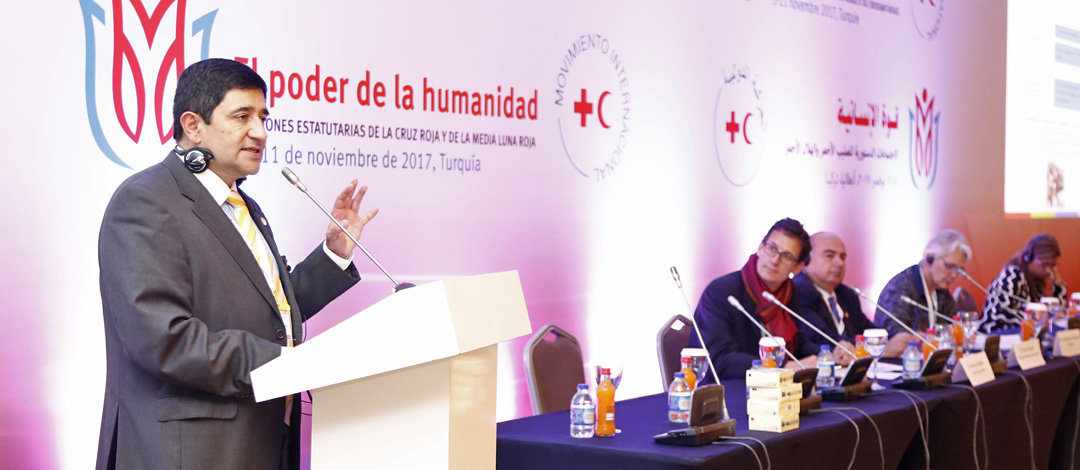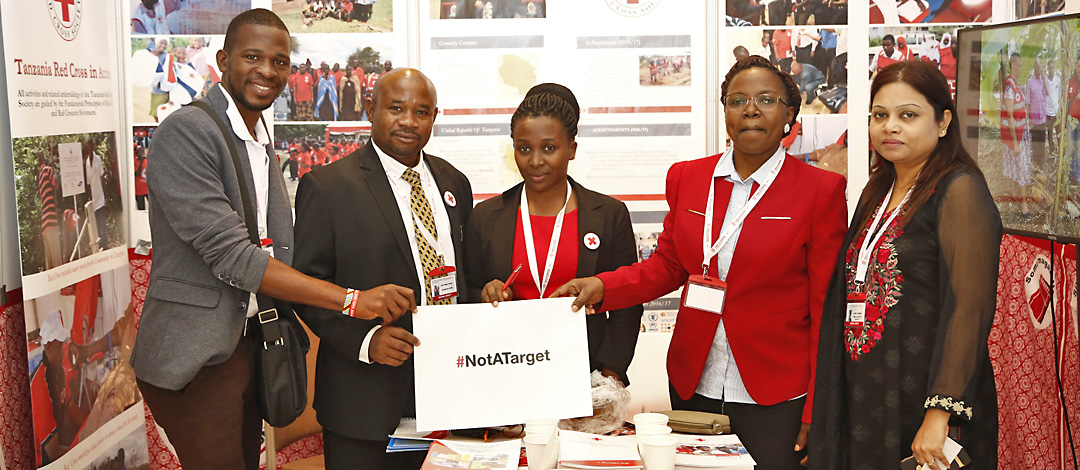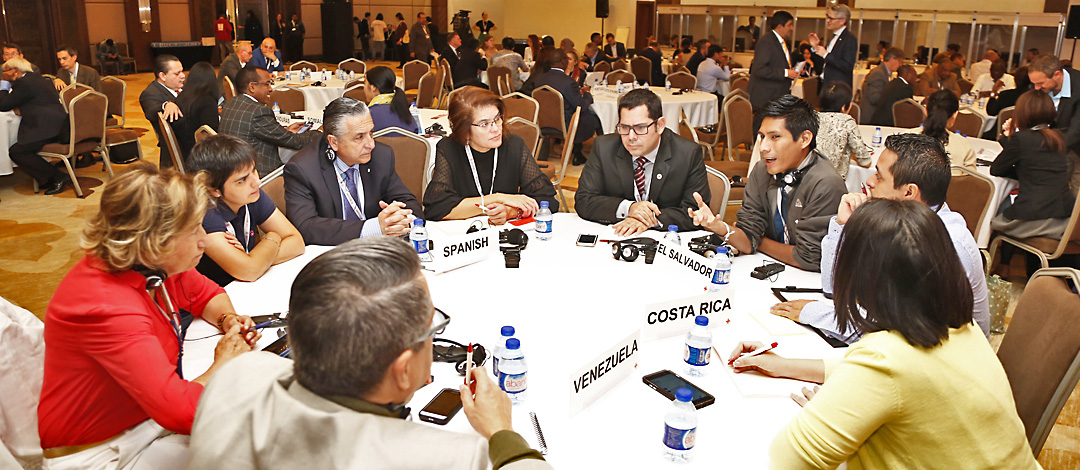
Resolutions help the Movement to prepare for the future
“Education is a basic human right, following close behind water, food and shelter, and is a key agent of change and builder of capacity”, one National Society noted, but its provision in emergencies is underfunded and far from meeting the needs.
However, the Movement now has a clear path towards addressing these gaps, after the Council of Delegates adopted a Resolution on Education: Related Humanitarian Needs.
In debate, delegates noted how the lives of children and young adults are damaged twice-over in disasters, conflict or crisis – first by the emergency, and then by the disruption to their education.
“In a disaster, one of the first questions I ask is ‘are your children going to school?’… I look forward to a time when the answer to my question is more often yes than no,” said one delegate.
Mental health
Introducing the Resolution on Addressing mental health and psychosocial needs, Swedish Red Cross President Margareta Wahlström said that Movement research – including information gathered during that morning’s successful workshop – indicated that there are no overlaps in programme coverage but rather a number of gaps, and that these gaps are widening.
ICRC Director-General, Yves Daccord, said that the needs were dramatic and were having a huge impact. “This Resolution asks you to put this at the core of our collective agenda. It is not an appendix – it is at the core of what we do when we do health. We want to harmonise our approach but also bring it to the States, because the Movement won’t be able to do this alone.”
Epidemics and pandemics
Moving from mental to physical health, a Resolution on Working towards an International Red Cross and Red Crescent Movement approach to Epidemics and Pandemics was introduced by IFRC’s Dr Julie Lynn Hall, ICRC’s Pascal Hundt, and Sierra Leone Red Cross volunteer Augusta Kumba Charles.
The trio presented the Resolution together. “We stand together because that is what we, as a Movement, will have to do in another outbreak,” said Dr Hall.
“Epidemics begin and end in communities,” they noted, “and communities have a critical role to play in preventing, detecting and responding to outbreaks.”
Restoring Family Links
Gustavo Lara Tapia (Dominican Red Cross), Emmanuel Kouadio (Ivorian Red Cross) and Yves Daccord (ICRC) presented the Resolution on Restoring Family Links strategy development. It welcomes the creation of the Working Group and calls upon all Movement components to integrate the provisions of the Code. Speaking on behalf of 21 National Societies, Emmanuel Kouadio emphasized that “this resolution would facilitate the approval of the resolution in 2019 that would take the Movement into the future.” One National Society added that “highest skills were already demanded from RFL practitioners in the field and that these tools would facilitate their work”.
International Humanitarian Law
Knut Dörmann (ICRC) presented the Resolution on International Humanitarian Law. On the 40th anniversary of the Additional Protocols, the resolution reiterates the mandate of the Movement to bolster the adoption by States of existing IHL instruments and their active participation in the current intergovernmental processes. The IFRC underlined the importance of “the integrity of the International Conference as highest instance of the Movement, and avoiding politicisation of an organ where not all members would be involved”. Several National Societies took the floor to express their keen appreciation of the essential role played by the ICRC and to welcome the late addition of a line on the importance of national commissions of IHL.
Closing the Council of Delegates, Chair Peter Maurer (ICRC President) and Vice-Chair Dr Kerem Kinik (President of Turkish Red Crescent Society and IFRC Vice-President) spoke of the great progress made during meetings that helped the Movement “prepare for the future”.
President Maurer thanked Dr Kinik, and the volunteers and staff of the Turkish Red Crescent Society for their hospitality, friendship, and the excellent organisation and good spirit of the 2017 Council of Delegates, RC2 Forum, and IFRC General Assembly.
Words to actions: Community engagement and accountability in practice
Three different sets of panelists from the Movement explored the ways of implementing community engagement at this popular and well-attended workshop on 11 November.
Pat Laberge from the Canadian Red Cross said that while the Movement is already doing community engagement, “the real challenge is to do so in immediate crisis situations, when organisations arrive from the outside and operations start in emergency. That’s where the National Society is key, in understanding needs and having trust of communities.”
Different examples were discussed, such as Yemen and South Sudan, showing that volunteers and entire communities need to be involved in defining assistance and how it should be provided to respond to the needs.
Shwe Cin Myint from the Myanmar Red Cross told how they had identified frustration from female IDPs regarding hygiene kits and modified it, choosing to rename them as “dignity kits”.
Mawra Mahmood of the Norwegian Red Cross demonstrated how much more is to be done: “We keep talking about integrating youth – the communities that we serve are younger themselves – but it’s not happening. We are in our bubble, talking our own language that is not understandable to communities. Are we really localised?”
Warning sounded over explosive weapons in populated areas
The massive use of explosive weapons in urban areas is having a devastating impact on populations, health care and vital infrastructure. It also poses huge risks for Movement staff and volunteers.
This was the stark assessment delivered by Bernt G. Apeland, Secretary General of the Norwegian Red Cross, during a workshop on the use of explosive weapons in populated areas.
Kathleen Lawand, Head of the ICRC Arms Unit, Legal Division, said the goal of the session was to raise awareness of the use of such weapons in urban environments, which she said had become the “new normal”.
“The Movement and the ICRC are calling on belligerents to avoid using explosive weapons that have wide-area effects in populated areas,” she added.
Samuel Paunila, Advisor on Ammunition Operations at the Geneva International Centre for Humanitarian Demining, showed that many heavy explosive weapons are designed to have wide-area effects, posing a significant risk to civilians and civilian infrastructure.

Upholding independence, neutrality and impartiality in the face of State responses and public reactions to contemporary global challenges
Workshop chair Dr Werner Kerschbaum, Secretary General of the Austrian Red Cross, asked participants to consider State policies and public opinion on migration and how the two interrelate; State and UN policies on preventing or countering violent extremism; and the Movement’s contribution to combating xenophobia and discrimination.
Panellists Balthasar Staehelin (ICRC), Fatima Gailani (IFRC) and Otillia Anna Maunganidze (Institute for Security Studies) each reflected on the rich debate among Movement participants during the workshop.
“I am hearing of the importance of the Fundamental Principles, and comments on the need to manage auxiliarity – how a balance must be struck between the principles and the auxiliary role,” said Mr Staehelin.
Ms Gailani said: “The Fundamental Principles are our base, our everything, but our existence in a country is dependent on the auxiliary role. We must prepare. We have to develop our capacities. And National Societies must have a strong legal base.”
Ms Maunganidze spoke of National Societies and the sensitive issue of combating extremism, noting: “Preventing violence and establishing systems to reduce marginalisation and stigma should be central – if you also reduce extremism at the same time, then well done.”
RFL in the 21st century
If you want to focus people’s minds on the theme of Restoring Family Links, what better way than through the eyes and words of two people reunited after four long years apart.
Saleh Musa Adam and his wife Nafisa Adam Abdi were separated and lost contact when war broke out in Libya in 2011.
“I thought I would never find my wife alive again,” Saleh told a packed workshop on Restoring Family Links in the Twenty-First Century. Thanks to the work of the British Red Cross and the ICRC – and Restoring Family Links – he did.
“This story shows us the power of our work. Millions of people are waiting for us to help them,” said Gustavo Lara, Director-General of the Dominican Red Cross, who was co-chair of the session.
So what of the future of RFL in the 21st century, as the Movement develops a new Strategy?
There was general agreement of the need to harness new technologies to meet the raised expectations of separated families, while recognising privacy and data protection risks.
“This is an opportunity to show the value of the Family Links Network and the power of the Movement, as a global network rooted in local communities,” said Florence Anselmo, Head of the ICRC Central Tracing Agency and Chair of the RFL Strategy Implementation Group.
Aligning the Movement on Mental Health and Psychosocial support

Mental health and psychosocial needs in situations of conflict or disaster are one of today’s “burning humanitarian issues”.
“These are the scars and injuries that are not really visible on people,” said Margareta Wahlström, President of the Swedish Red Cross and Chair of the Workshop on Addressing Mental Health and Psychosocial Needs.
The session recognized current gaps and overlaps in mental health and psychosocial support as the Movement moves towards a common policy framework to harmonize existing approaches.
Elhadj As Sy, IFRC Secretary General, noted the importance of paying attention to the needs of our own staff “who suffer from the same circumstances affecting the people we are supporting”.
Wrapping up the session, Yves Daccord, ICRC Director-General, urged the audience to help bridge the growing gap in mental health and psychosocial support. “It cannot be treated as an appendix, it needs to be part of the spectrum,” he said.
Workshop explored link between respect for emblems and protection of health workers
The stories came from nearly every corner of the globe. Health care workers killed. Hospitals and clinics shelled or bombed. Ambulances stopped at roadblocks or hit with gunfire.
While each attack was different, they had a common thread. They happened even when the workers, facilities or vehicles were clearly marked with the red cross or red crescent emblems.
One person sharing his experience was Mr John Lobor, Secretary General of the South Sudan Red Cross, who was one of around 200 people gathered for a workshop exploring the link between respect for the emblems and the protection of health care and the wounded and sick.
“Attacks are mainly motivated by the desire to get drugs and treatment,” he said. “But it is also a strategy to deny the population access to treatment, especially if they are seen as sympathizing with [the attackers’] opponents.”
Panelists and participants spoke of their efforts to prevent such attacks and abuses, from raising awareness via theatre performances, first aid training and meetings with arms bearers to lobbying for the enactment of laws and global agreements that protect the emblems and health workers.
Suggested Tweets
Aid workers are often exposed to trauma, loss, injury and even death in their daily work. #RedCross #RedCrescent are scaling up efforts to address the psychosocial needs of our volunteers and staff. #PowerOfHumanity
FACT: Each year of education reduces the risk of armed conflict by around 20% (@WorldBank). #RedCross #RedCrescent are committed to stepping up education to help shape more peaceful and prosperous communities. #PowerOfHumanity

